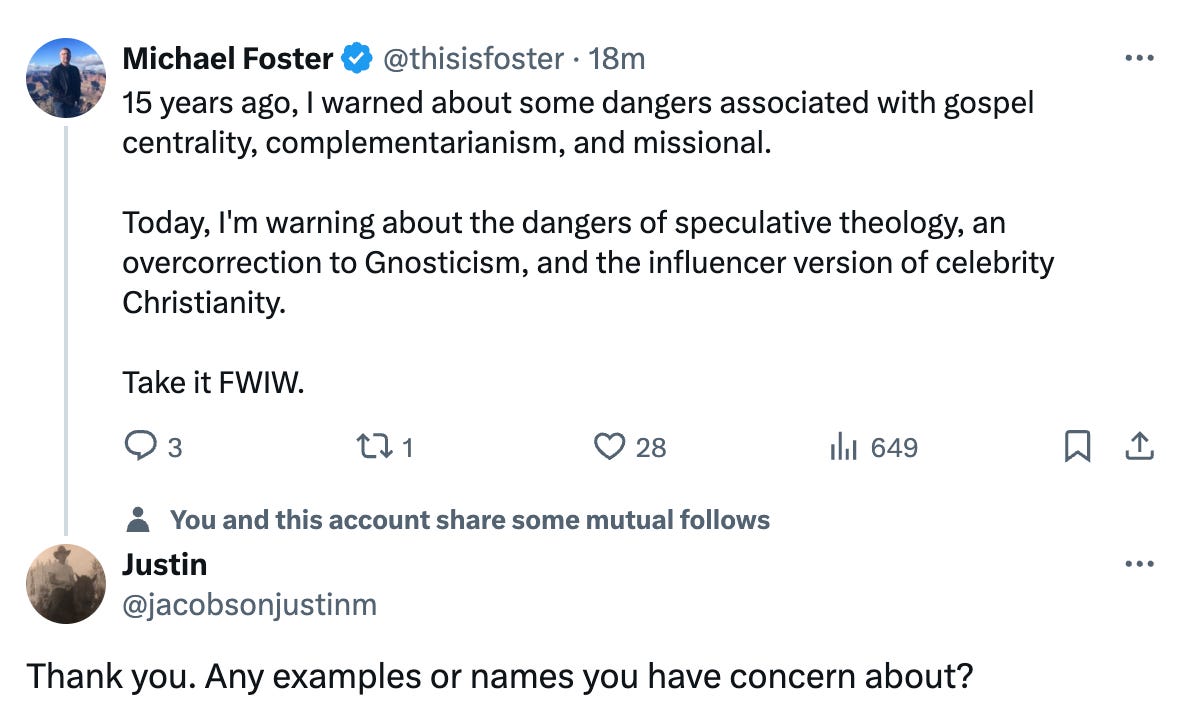On Naming Names
I got this good question in response to a Tweet this morning…
Let me explain my approach...
In 1 Timothy 1:20, Paul mentions that he had Hymenaeus and Alexander excommunicated. So, he had no issue with “naming names.” However, earlier in the chapter, he writes:
“3 As I urged you upon my departure for Macedonia, remain on at Ephesus so that you may instruct certain men not to teach strange doctrines…”
Notice that he only says “certain men.” There are individuals he has in mind, but he doesn’t name them. He continues:
“4…nor to pay attention to myths and endless genealogies, which give rise to mere speculation rather than furthering the administration of God which is by faith. 5 But the goal of our instruction is love from a pure heart and a good conscience and a sincere faith. 6 For some men, straying from these things, have turned aside to fruitless discussion, 7 wanting to be teachers of the Law, even though they do not understand either what they are saying or the matters about which they make confident assertions.”
Paul is accusing these unnamed men of teaching strange doctrines, turning aside to fruitless discussions, and not understanding the law. Those are significant accusations, yet he doesn’t name names. Why? Because sometimes you name names, and sometimes you don’t.
I think modern Christians are particularly obsessed with personalities—that is to say, we are obsessed with names. We love to love names. We love to hate names. This is why most haters start out as fanboys.
It’s also why so many “discernment ministries” are really just a subculture of “Evangelical Celebrity Christianity.”
They are like Christian paparazzi who live off Christian celebrity culture. They're always talking about the day's newest scandal and controversy, like the Athenians who spent their time in nothing other than telling or hearing something new. They revel in naming names.
Still, I'm not opposed to "naming names," but generally speaking, it isn't as effective as addressing principles and practices. I know some will say, "Why not do both?"
And that might be the right approach at times. However, even if you "name names," you still need to explain what those individuals are doing wrong (i.e., their principles and practices) if you want to open someone's eyes.
Part of the problem is that people tend to be extremely defensive about personalities and will put up their guard if you start with an attack on a person. Again, this is a form of fan-boy syndrome. It's often better to educate them and allow them to come to their own conclusions in their own time.
They might ask, "Are you talking about this or that person?"
A good response is, "Does the shoe fit?"



Well said. I like your approach of stating principles and practices rather than naming names because whilst the latter are constantly changing, erroneous principles and practices are always so and should be identified as such, no matter who is practising them.
Saw a video of Josh Howerton preaching the other day. His skinny jeans looked like they were spray painted on. Skinny jeans have become a thing with some preachers these days and I’m all in on naming names and denouncing skinny jeanism. Well meaning people can disagree about things like paedocommunion, but there is no excuse for a preacher strutting around in what are essentially yoga pants.